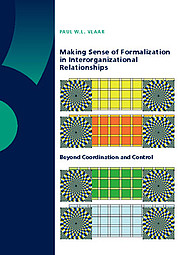Making Sense of Formalization in Interorganizational Relationships: Beyond Coordination and Control Defended on Thursday, 16 February 2006
Strategic alliances, buyer-supplier relationships, joint ventures and other forms of interorganizational cooperation are of increasing importance for the competitive advantage of organizations. Formalization – in the form of contracts, rules and procedures – is considered to be a crucial factor for these relationships. Nevertheless, an integrative framework of its role in interorganizational relationships has hitherto remained absent in the literature. Drawing on conceptual developments, an in-depth case study and survey data, this study provides such an integrative framework. Six main research findings emerge. First, tensions between the need and the ability to formalize can be reduced by investing in information processing and sensemaking. Second, formalization has functions beyond coordination and control, such as increasing legitimacy and enabling sensemaking. Third, managers are not only occupied with the “right” degree of formalization, but also with managing tensions between the functions and dysfunctions of formalization. Fourth, when formalization is accompanied by standardization, its contribution to interorganizational performance declines, due to lower degrees of “mindfulness” by contracting parties. Fifth, interorganizational performance is highly dependent upon the levels of formalization and trust at the start of relationships, with intermediary levels of both governance forms exhibiting more positive effects than extreme levels. Finally, formalization is substituted and complemented by other governance mechanisms, requiring partners to consider portfolios of mechanisms when deciding on formalization. These findings and the integral framework to which they are connected suggests that researchers and practitioners should regard formalization from multiple disciplines, theories and perspectives. They enrich their understanding of its role in interorganizational relationships, and enable them to utilize formalization so that it contributes to performance.
Keywords
Formalization, Interorganizational Management, Codification, Strategic Alliance, Coordination, Control, Legitimacy, Sensegiving, Sensemaking, Dialectics, Trust, Evolution, Information Processing









